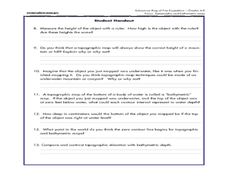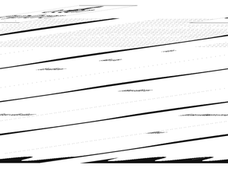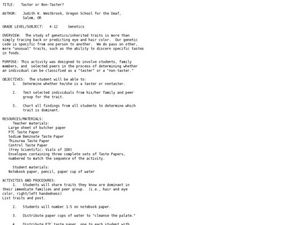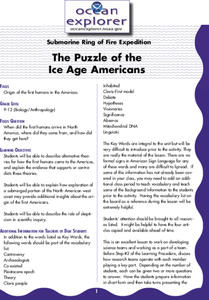Curated OER
The Sense of Hearing
Students study the cycle of how we listen and hear our own speech. They examine sound waves, and the role of the nervous system in hearing. They investigate the cues besides lipreading that deaf people rely on for comprehension.
Curated OER
A Watered-Down Topographic Map
Eighth graders explore the ocean floor. In this topography lesson, 8th graders compare topographical maps to bathymetric charts. They will create a topographic map and note landmarks and other land features.
Curated OER
The Galapagos Spreading Center
Students explore the basic concept of seafloor spreading. They describe the processes involved in creating new seafloor at a mid-ocean ridge. They investigate the Galapagos Spreading Center system.
Curated OER
Exploring Alaska's Seamounts - Volcanoes, Plates, and Chains
Students examine the formation of seamounts in the Gulf of Alaska. In this seamount instructional activity, student focus on how the Axial-Cobb-Eikelberg-Patton chain was formed. They learn the associated vocabulary, and watch a teacher...
Curated OER
Candy Chemosynthesis
Students explain chemosynthesis and photosynthesis using candy. In this chemosynthesis lesson, students work cooperatively to create a visual explanation of the chemical equations of photosynthesis and chemosynthesis.
NOAA
What's New?
Biodiversity in some areas is more diverse than one might think. Using a two-day lesson, pupils consider the biodiversity of the Hudson Canyon and the characteristics of one organism. They begin with an analysis of the common earthworm...
Curated OER
Finding the Way
Students identify and research navigational tools used in deep sea explorations. They are introduced to a compass, the Global Positioning System and sonar technology and then describe their uses in underwater exploration.
Curated OER
Survivors on the Ocean Ridge
Students discover the uniqueness of deep sea hydrothermal vent organisms through an exploration of the NOAA Galapagos Rift Expedition. They study the genetics and evolution of a shrimp species that lives near the vents then they...
Curated OER
Submersible Designer
Learners work in groups to design, build, and test a submersible prototype. In this engineering lesson, students learn about the importance and design of submersible vessels and apply their knowledge by building one of their own. They...
Curated OER
Journey to the Unknown
Students explore the ocean depths. In this scenario based lesson, students pretend they are on a submarine in an unknown part of the ocean. By using clues the class discusses and determines where they are in the ocean. They follow up...
Curated OER
What on Earth is That and How Can I Get One?
Students examine how we use submersibles. In this technology based lesson, students examine various technologies used by submersibles in ocean exploration.
Curated OER
Taster of Non-Taster?
Students investigate their own inherited traits by using taste papers. In this genetic traits lesson plan, students test their ability to taste various substances, which is determined by inherited genetic traits. They take home taste...
Curated OER
the biggest Plates on Earth
Students understand the movement of tectonic plates. In this tectonic plates lesson, students access prior knowledge of convergent, divergent, and transform boundaries. Students discuss energy transfer involved in plate motion. ...
Curated OER
Designing Tools for Ocean Exploration
Students explore the complexity of ocean exploration and the technological applications and capabilities required for ocean exploration. They consider the importance of teamwork in scientific research projects.
Curated OER
Special Traits: Alabama quarter reverse
Who knew a state quarter could say so much? Alabama's quarter is embossed with an image of Helen Keller, pupils will use this image to think about what the phrase "Spirit of courage" means. They will use a graphic organizer to...
Curated OER
Thai Children's Trust: School for the Blind
Students explore their five senses by experimenting with classmates. In this blindness lesson, students utilize blindfolds while performing everyday activities and discuss the inherent challenges of not having vision. Students view a...
Curated OER
Blinded by the Light
Students recognize that the colors they see are a result of the reflection of light. In this light and color lesson, students predict what color will be produced when lights are mixed. They identify the three primary colors and secondary...
Curated OER
Mystery of the Alaskan Seamounts
Students study seamounts and the processes that form them. In this Gulf of Alaska lesson students interpret data and investigate a hypothesis.
Curated OER
The Senses: Hearing and Sight
Eighth graders consider how they use their senses. In this biology lesson plan, 8th graders understand the definition of a disability and how it affects Americans who are hearing impaired or deaf, and those Americans who are visually...
Curated OER
Living With the Heat: The Ring of Fire
Students investigate the planet Earth's infamous ring of fire and the life that thrives from it. For this ocean environment lesson, students investigate hydrothermal vents and how organisms thrive off their heat. Students complete a...
Curated OER
Experimenting with Sound
Students explore physical science by completing a worksheet. In this sound perception lesson, students collaborate in small groups to research sound properties on the Internet and in libraries. Students conduct a listening experiment by...
Curated OER
Roots of the Hawaiian Hotspot
Students explain the processes of plate tectonics and volcanism that resulted in the formation of the Hawaiian Islands. They describe, compare, and contrast S waves and P waves. They explain how
Curated OER
The Puzzle of the Ice Age Americans
Students describe alternative theories for how the first humans came to the Americas, and explain evidence that supports or contradicts these theories. They examine the role of skepticism in scientific inquiries.
Curated OER
Mapping Deep-Sea Habitat
Students create a two-dimensional topographic map and a 3-D model of landforms. In this creative instructional activity students create 2 and 3-D objects and learn how to interpret the data from these things.

























